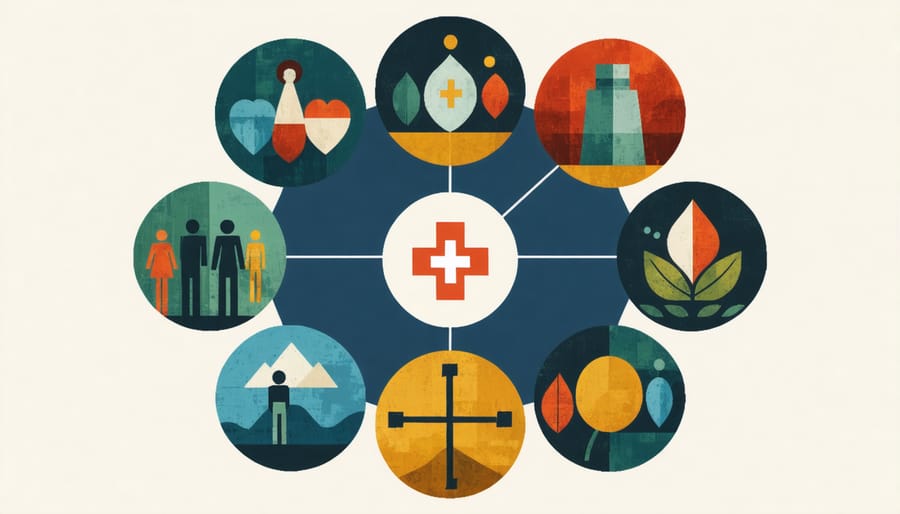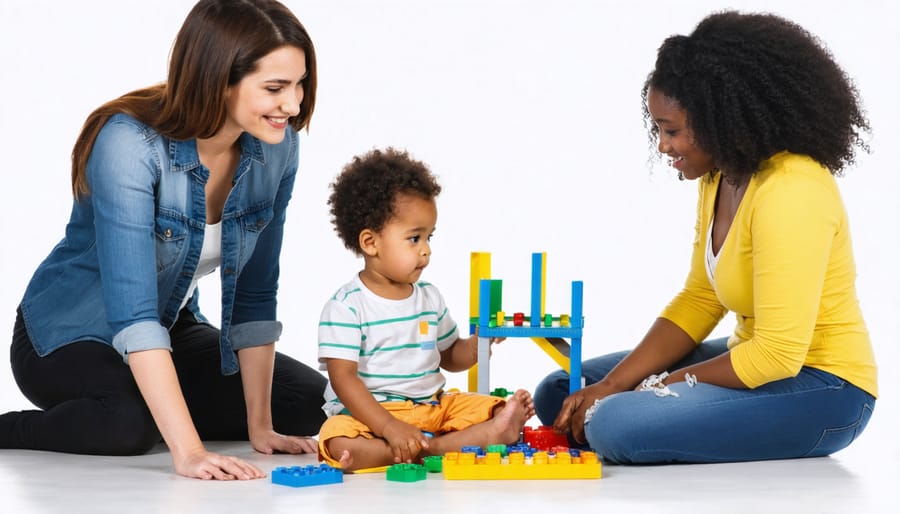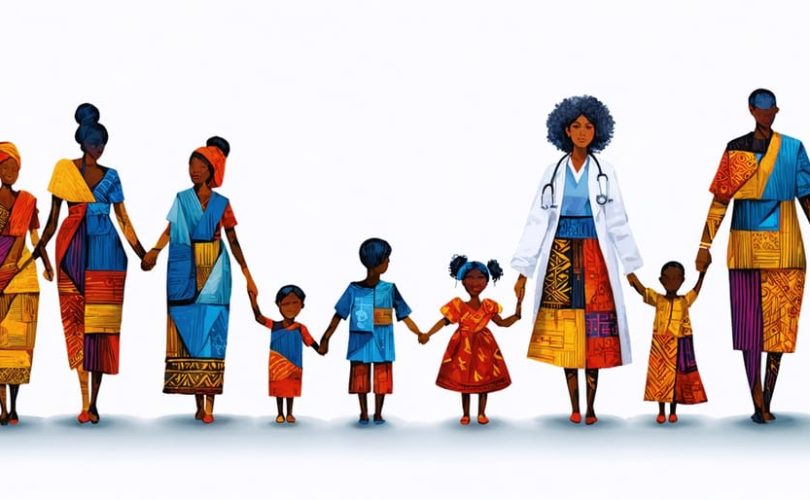Cultural sensitivity transforms healthcare from a one-size-fits-all approach into personalized, effective care that genuinely serves diverse communities. When healthcare providers understand and respect cultural beliefs, traditions, and practices, patients feel heard, valued, and more likely to engage actively in their treatment journey.
Consider Maria, a Spanish-speaking grandmother who initially hesitated to seek medical care because previous providers dismissed her traditional healing practices. When she found a clinic that integrated her cultural beliefs with modern medicine, not only did her health outcomes improve, but she became an advocate for her entire community’s healthcare engagement.
Research shows that culturally sensitive healthcare leads to better patient compliance, reduced medical errors, and improved health outcomes across all demographic groups. For children and families especially, cultural sensitivity creates a foundation of trust that can span generations of care.
Healthcare providers must recognize that cultural competency goes beyond language translation—it encompasses understanding family dynamics, religious beliefs, traditional medicine practices, and cultural perspectives on health and illness. This comprehensive approach ensures that every patient receives care that respects their cultural identity while delivering the highest standards of medical treatment.
As our communities grow increasingly diverse, cultural sensitivity in healthcare isn’t just an ethical imperative—it’s a crucial component of effective, equitable healthcare delivery that builds stronger, healthier communities for everyone.
Understanding Cultural Sensitivity in Children’s Mental Health

Why Cultural Background Matters in Mental Health Care
Cultural background shapes how we view mental health, express emotions, and seek help. As Maria Rodriguez, a child psychologist with 20 years of experience, explains, “What one culture sees as a mental health concern, another might view as a spiritual experience or temporary life challenge.”
Family beliefs and traditions significantly influence whether parents seek professional help for their children’s mental health needs. Some cultures emphasize family privacy and may prefer to address mental health challenges within the family unit. Others might turn to traditional healers or religious leaders before considering clinical mental health services.
These cultural differences can impact how symptoms are described and understood. For instance, some cultures might express anxiety through physical complaints like headaches or stomach problems rather than emotional terms. Understanding these nuances helps healthcare providers offer more effective, culturally appropriate care.
Dr. James Chen, a multicultural counseling specialist, shares, “When we acknowledge and respect cultural perspectives, families feel more comfortable discussing mental health concerns and are more likely to engage in treatment.” This cultural awareness creates a foundation of trust, leading to better outcomes for children’s mental well-being.
The Impact on Children and Families
When healthcare providers practice cultural sensitivity, children and families experience significantly better health outcomes and stronger relationships with their medical team. Dr. Sarah Chen, a pediatric psychologist, shares how one of her young patients, Miguel, initially struggled with therapy until she incorporated elements of his family’s cultural traditions into their sessions.
Cultural sensitivity helps children feel seen and understood, making them more likely to open up about their health concerns. For families, it creates a trusted environment where they can freely discuss traditional healing practices, dietary preferences, and cultural beliefs that may impact their child’s care.
Research shows that families who receive culturally sensitive care are more likely to follow treatment plans, attend follow-up appointments, and actively participate in their children’s healthcare decisions. This engagement leads to better health outcomes, reduced anxiety during medical visits, and increased satisfaction with healthcare services.
Additionally, children from diverse backgrounds develop stronger self-esteem when their cultural identity is acknowledged and respected in healthcare settings. This positive experience often extends beyond the clinic, influencing their overall well-being and willingness to seek healthcare in the future.
Building Trust Through Cultural Understanding

Communication Across Cultural Boundaries
Effective cross-cultural communication in healthcare settings begins with recognizing that each family brings their unique cultural perspective to healthcare interactions. Healthcare providers can build trust and understanding by practicing active listening and showing genuine interest in learning about families’ cultural beliefs and practices regarding health and healing.
Language barriers often present significant challenges. When working with families who speak different languages, it’s essential to use professional interpreters rather than relying on family members or children to translate. This ensures accurate medical communication and maintains appropriate family dynamics. Just as effective family communication strengthens relationships at home, clear communication in healthcare settings helps build trust between providers and families.
Simple strategies that make a difference include:
– Speaking clearly and avoiding medical jargon
– Confirming understanding through teach-back methods
– Respecting traditional healing practices when they don’t conflict with medical care
– Learning basic greetings in commonly spoken languages
– Using culturally appropriate non-verbal communication
– Providing written materials in multiple languages
Remember that communication styles vary across cultures. Some families may prefer direct communication, while others might find it disrespectful. Taking time to understand these preferences helps create a supportive environment where families feel comfortable sharing their concerns and asking questions about their child’s health care.
Family-Centered Cultural Care
In healthcare settings, understanding and respecting family dynamics is crucial for providing effective care. Research shows that family support in mental health treatment significantly improves outcomes, especially for children and adolescents.
When developing treatment plans, healthcare providers should actively involve family members and consider their cultural values, beliefs, and traditions. This might include accommodating extended family involvement in decision-making, respecting traditional healing practices alongside modern medicine, or adapting communication styles to match family preferences.
Dr. Maria Chen, a pediatric psychiatrist, shares: “I’ve seen remarkable improvements in treatment adherence when we embrace family traditions rather than dismiss them. For instance, incorporating traditional meditation practices alongside conventional therapy has helped many of my young patients feel more comfortable with their treatment plan.”
Healthcare providers can create more inclusive care environments by:
– Asking families about their cultural practices and beliefs
– Including extended family members in treatment discussions when appropriate
– Accommodating religious or cultural dietary restrictions
– Respecting cultural celebrations and observances
– Making space for traditional healing practices that complement medical treatment
This collaborative approach helps build trust, ensures better compliance with treatment plans, and creates a supportive environment where families feel valued and understood.
Practical Steps for Parents and Healthcare Providers
Questions to Ask Your Healthcare Provider
Here are important questions to help ensure your child receives culturally sensitive healthcare:
“How do you accommodate different cultural beliefs and practices in your treatment approach?”
This helps you understand if the provider is willing to adapt their care methods to align with your family’s values and traditions.
“What experience do you have working with families from our cultural background?”
While providers don’t need to share your background, experience with similar families can indicate cultural competency.
“How do you handle language barriers?”
Ask about interpreter services and translated materials if English isn’t your primary language.
“How do you include family members in healthcare decisions?”
Different cultures have varying approaches to family involvement in medical care.
“Are you familiar with traditional healing practices from our culture?”
This helps gauge their openness to incorporating or respecting traditional methods alongside conventional treatment.
“How do you ensure staff members are trained in cultural sensitivity?”
Understanding the practice’s commitment to cultural competency can help you feel more confident about the care your child will receive.
“Can you accommodate dietary restrictions or preferences based on our cultural or religious beliefs?”
This is especially important for in-patient care or treatment involving medication.
Remember, asking these questions isn’t confrontational – it’s about ensuring the best care for your child. Good healthcare providers will welcome these discussions and appreciate your advocacy for culturally appropriate care.
Creating Inclusive Treatment Plans
Creating effective treatment plans requires a thoughtful blend of clinical expertise and cultural understanding. Healthcare providers should begin by having open conversations with families about their cultural beliefs, values, and practices that might influence treatment preferences and outcomes.
Dr. Maria Chen, a pediatric mental health specialist, emphasizes the importance of family involvement: “When we include family members in treatment planning, we often discover valuable insights about traditional healing practices or cultural perspectives that can enhance our care approach.”
Consider these key elements when developing culturally inclusive treatment plans:
– Incorporate familiar cultural practices and beliefs that promote healing
– Adjust communication styles to match family preferences
– Include extended family members when culturally appropriate
– Respect traditional healing methods that complement medical treatment
– Account for language preferences and provide adequate interpretation services
– Consider religious or spiritual beliefs that may impact treatment
It’s essential to remain flexible and adapt treatment strategies based on cultural feedback. For example, some cultures may prefer group-based interventions over individual therapy, or they might respond better to narrative approaches rather than direct questioning.
Remember that cultural sensitivity isn’t about making assumptions based on a patient’s background. Instead, it’s about creating an open dialogue that allows families to share their unique perspectives and preferences, then incorporating these insights into a personalized treatment approach that respects both clinical best practices and cultural values.
Resources and Support Networks
Building a strong support network is essential for delivering culturally sensitive healthcare. Fortunately, many organizations and resources are available to help healthcare providers and families navigate cultural differences in medical settings. Local community support services often provide cultural liaisons and interpreters who can bridge communication gaps between healthcare providers and families from diverse backgrounds.
Cultural competency training programs are widely available through healthcare organizations, professional associations, and educational institutions. These programs offer valuable insights into different cultural practices, beliefs, and healthcare approaches. Many hospitals now maintain diverse resource libraries featuring multilingual materials and cultural guides for staff and families.
Online platforms and mobile apps have made accessing cultural resources easier than ever. These digital tools often include translation services, cultural calendars, and educational materials in multiple languages. Social media groups and online forums also provide spaces where families can connect with others who share similar cultural backgrounds and healthcare experiences.
Local cultural organizations and religious institutions can serve as valuable partners in healthcare delivery. They often offer guidance on cultural practices, dietary requirements, and spiritual beliefs that may impact medical care. Additionally, many communities have cultural health advocates who can help families navigate the healthcare system while ensuring their cultural needs are respected and understood.
Remember to regularly update your resource list as new services become available in your community. Building strong relationships with cultural organizations and support networks helps create a more inclusive and effective healthcare environment for all families.

Cultural Sensitivity Success Stories
In Boston Children’s Hospital, a groundbreaking program demonstrates the power of culturally sensitive healthcare. When young Maria, a Spanish-speaking child struggling with anxiety, first arrived, she was paired with a bilingual therapist who understood both her language and cultural background. The therapist incorporated traditional healing practices familiar to Maria’s family alongside evidence-based treatments, resulting in significantly improved outcomes and stronger family engagement.
At Minneapolis Children’s Clinic, staff implemented a comprehensive cultural training program that transformed their approach to serving diverse communities. They created dedicated prayer spaces, adjusted appointment schedules around religious observances, and established partnerships with local cultural leaders. These changes led to a 40% increase in appointment attendance among immigrant families and improved treatment adherence.
The success of these initiatives inspired the creation of broader mental health support networks that actively incorporate cultural considerations. In Seattle, a collaborative program between healthcare providers and local Indigenous communities developed culturally appropriate healing circles for youth, combining traditional wisdom with modern therapeutic approaches.
Dr. Sarah Chen, a pediatric psychiatrist in San Francisco, shares a particularly moving example: “We worked with a young Vietnamese boy who was reluctant to discuss his emotions – a common cultural trait. By incorporating storytelling and metaphors from his culture, we created a comfortable space for him to express himself. His progress was remarkable once we aligned our approach with his cultural framework.”
These success stories highlight how cultural sensitivity isn’t just about translation services or diversity training – it’s about creating authentic connections and understanding that lead to better health outcomes. When healthcare providers take the time to understand and respect cultural differences, they build trust that extends beyond individual patients to entire communities.
In our journey through understanding cultural sensitivity in healthcare, we’ve seen how deeply cultural awareness impacts the quality and effectiveness of mental health services for children and families. By embracing cultural differences and actively working to understand diverse perspectives, healthcare providers can create more welcoming, inclusive, and successful treatment environments.
Remember that cultural competency isn’t a destination but an ongoing process of learning and growth. Each interaction with families from different backgrounds offers an opportunity to deepen our understanding and improve our care approach. Small steps, like learning basic greetings in different languages, acknowledging cultural celebrations, or simply asking families about their preferences and beliefs, can make a significant difference in building trust and rapport.
Healthcare professionals must continue educating themselves about various cultural practices, beliefs, and communication styles. This commitment to cultural awareness helps break down barriers to mental health care and ensures that all children receive the support they need to thrive.
As parents, educators, and healthcare providers, we share a common goal: supporting the mental well-being of our children. By working together with cultural sensitivity and respect, we can create a more inclusive and effective mental healthcare system that truly serves all members of our diverse community. Let’s make cultural competency a fundamental part of our approach to mental health care, ensuring better outcomes for every child we serve.







